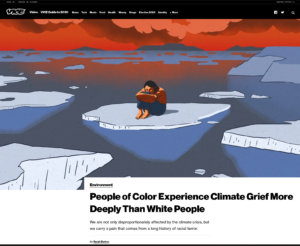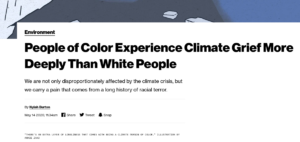No offense, but the notion that white people need "a climate person of colour" to save them from white person-induced bad weather is very deeply insane. https://t.co/FPdKhtXd2A
— Tom Nelson (@tan123) June 9, 2020
Claim: 'People of Color Experience Climate Grief More Deeply Than White People' – 'Disproportionately affected by the climate crisis' will & 'carry a pain that comes from a long history of racial terror' – VICE – https://t.co/d15klKQKc7
— Marc Morano (@ClimateDepot) May 17, 2020
Oh my! Also see: Flashback 2019: ‘White People’ blamed for causing Cyclone Idai in Africa – ‘Even the white man’s own science corroborates what we blacks know’ https://t.co/HHeQv2SYf8
— Marc Morano (@ClimateDepot) May 17, 2020
It just keeps getting more ludicrous and laughable.
— Cosmo270 (@OlmsteadSam) May 17, 2020
https://twitter.com/InTreyb/status/1262127277766303744
Yet, just this week Twitter was awash with sappy lamentations about Vice's layoffs…
According to Anna, an "objectively essential" writer penned that climate piece. pic.twitter.com/NpqeqIjNE0
— Mike Moss (@_MikeMoss) May 17, 2020
The (black) reverend Jesse Jackson's signature phrase for decades has been "Keep hope alive!" For any doubts, just search for his 1984 Democratic convention speech.
— William Orange (@maillotorange) May 18, 2020
When you can’t make a logical, legitimate argument backed with data – thrown down the race card. https://t.co/TbAKhUiUk1
— 🎶Julann🌹🍿 (@julannwis) May 18, 2020
#
Vice Mag: People of Color Experience Climate Grief More Deeply Than White People
We are not only disproportionately affected by the climate crisis, but we carry a pain that comes from a long history of racial terror.
By Nylah Burton
When the wildfires hit Australia last year, Bee Cruse was horrified at the sight of the red sky, the black ash falling like snow, and the smoke choking the whole East Coast.
The fires were a direct reminder of the British genocide against Aboriginal and Torres Strait Islander people like her, and the tearing of them from country and their traditional ways of land management.
In an article for Vox, Cruse, a Wiradjuri, Gomeroi, and Monaroo-Yuin storyteller, told me, “We see and feel the spirit of our animals and our land; they are our ancestor spirits. We don’t own country, country owns us; we come from her to protect her. When country hurts, we hurt. When our animals, our spirit cousins, cry, we cry.”
What Cruse was describing was climate grief, a psychological phenomenon that affects Black and Indigenous peoples, and other people of color, in uniquely devastating ways.
Just as we are seeing with the COVID-19 outbreak, environmental racism forces people of color, especially Black and Indigenous peoples, to bear the brunt of global disaster. We are not only disproportionately affected by the climate crisis—breathing in more pollution, living in communities with higher temperatures, suffering from more medical conditions, experiencing more natural disasters, and being displaced at much higher rates—but we carry the pain of the climate crisis deep inside us.
In its 2014 report, Beyond Storms & Droughts: The Psychological Impacts of Climate Change, the American Psychological Association (APA) found that the climate crisis was affecting human mental health across the globe.
Anyone can experience climate grief, regardless of their identity. But for us, our grief—and our anger—is rooted in centuries of painful history, and the current ecological violence hurled at our communities.
“Just like other stressors that people of color experience, ecological grief is often magnified,” said Dr. Tyffani Dent, a licensed psychologist and author, in an interview.
“People of color know…society is going to make sure we’re impacted first, and impacted the hardest,” Dent said.
The climate crisis is linked to our oppression
Xiye Bastida, a youth climate activist, a member of the Indigenous Mexican Otomi-Toltec nation, and an organizer of Fridays for Future, says that her climate grief is deeply tied to her Indigenous identity.
For Black and Indigenous peoples, you could argue that the history of our oppression is the story of the Anthropocene itself—the current geological age defined by the dominant influence that human activity has had on mass extinction, climate, and the environment. Without colonization, the trans-Atlantic slave trade, and the genocide and oppression of Indigenous peoples around the world, we likely would be living in a different reality.
Research has bolstered the idea that white supremacy has led to the climate crisis. Scientists from University College London found that the mass genocide that accompanied the colonization of the Americas in the 15th century permanently altered Earth’s climate, due to “a huge swathe of abandoned agricultural land” that “pulled down enough carbon dioxide from the atmosphere to eventually chill the planet.”
Ravenous for the mass production of lucrative commodities such as salt, cotton, and sugar, the slavemasters and colonists stripped the land in what’s now known as Canada and the United States, the Caribbean, and South America, murdering countless Africans and Indigenous peoples along the way.
Worldwide, the memory of indescribable racial terror informs the climate grief of our people.
…
Bastida, whose hometown in Mexico experienced a devastating flood, knows how these tears can move us to action.
“Because Black, Indigenous, and brown communities are the most affected, it is indicative of not only more grief, but also more action. My personal climate grief was addressed when I started being an activist, having a purpose, (saying) ‘I’m not gonna let this happen.’”
“Hope is such a white concept.”
Heglar says that too often, the white-led climate community leans on the idea of hope, which can lead to inaction.
Hope is “such a white concept,” Heglar said. “You’re supposed to have the courage first, then you have the action, then you have the hope. But white people put hope at the front. Their insistence on hope for all of these years has led to exactly where? Nowhere.”
“There’s a certain loneliness that comes with being a climate person,” Heglar said. “Then there’s an extra layer of loneliness that comes with being a climate person of color, because you’re just stuck in this perpetual position of trying to save white people from themselves. And it’s so fucking exhausting.”
But for Heglar, that feeling has been relieved somewhat by finding ways to help one another heal. “In 2019, people of color really took up space in the climate movement in a way that had never been done before; we made our presence known. And so that has (made me) feel a lot less lonely,” she said.
People of color are connected by historical trauma. And when we come together and share our experiences, we can help reshape this world into something new.
As Kritee said, “We are part of a river of grief. And we are never alone.”
Nylah Burton is a writer based in Washington D.C., who covers mental health, climate, and race. Follow her on Twitter.
Have a story for Tipping Point? Email [email protected]
This article originally appeared on VICE CA.
#
Flashback 2015:
@ViCE Climate Depot’s Morano: HBO's VICE Show Manipulated My Antarctic Ice Interview http://t.co/cbuALTnhhT via @ClimateDepot
— Marc Morano (@ClimateDepot) March 13, 2015





